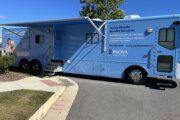While the emotional toll of the COVID-19 pandemic isn’t unique to any industry or community, it’s safe to say that the scientific community has spent a considerable portion of the past year trying to understand the virus and how we can loosen its grip on our way of life. I’ve seen this firsthand in my research and clinical work at Memorial Sloan Kettering Cancer Center, where over the past year we’ve learned everything we can to ensure we research and treat cancer in the safest possible way in the context of the pandemic.
Learning about the cause, effects and trajectory of COVID-19 is a double-edged sword: It’s interesting from a scientific perspective, but it can have devastating effects when it comes to mental health and our sense of personal and collective well-being. Although the recent drop in COVID-19 cases and increased vaccine distribution is cause for cautious optimism, we still have months to go before reaching a collective sense of normalcy, safety and security. With a painful year behind us and an unclear future ahead, I suggest a few steps we can take to reduce stress and stay positive.
[Read: Health Care Providers Pivot Quickly to Respond to COVID-19.]
Take Time and Space for Yourself
By now, it’s clear that the pandemic — especially due to the shift to working from home for many people — has blurred the line between being on and off the clock. While our jobs can provide a welcome distraction from the often heart-wrenching news around us, it’s becoming increasingly tricky (and important) to find time and space for ourselves.
To that end, I recommend taking breaks from one of the chief personal space invaders of the past year: Zoom (or whatever your video conferencing platform of choice might be). Block out time each day as “no Zoom” territory or identify a “no Zoom” room, and if you can manage it, take a day or a full week away from your computer entirely. I find that I need one day per weekend off screens entirely and at least one day at work without back-to-back Zooms.
It’s also beneficial to pursue an interest outside of your scientific focus area. This doesn’t just mean doom scrolling more — it means picking up that novel you put off reading or lacing up your sneakers for a head-clearing jog. Share your passions with those around you and inspire others to re-kindle old interests or find new ones!
And on the topic of moving around, it’s crucial to avoid sitting and working in the same exact spot each day. Change your scenery and rearrange your office or lab set-up, even if that just means tossing up a poster from a concert you saw back when dancing to live music in a crowded field was possible.
Doing little things for yourself can go a long way toward lifting your spirits and inspiring optimism. At a time when we’re all struggling, rest and non-work mental stimulation can equip you to be there for those around you.
[Read: Psychiatrist Helps Health Care Workers Cope With COVID-19.]
Shine a Light on Your Peers
While doing something nice for someone else is just a good thing to do by any measure, it’s also a surefire way to boost your own emotional state. Considering how the pandemic is taking a toll on all of us, there’s never been a better time to support your broader community, such as colleagues, trainees and mentors. Reach out with a friendly check-in and see if they’d like to chat, or offer your eye on a scientific paper, research project or something they’re working on.
On a similar note, find ways to lift each other up, whether that means finding a new opportunity to mentor someone or going out of your way to compliment a peer on their recent Zoom talk or paper. Whether we know it or not, we always benefit from positive feedback, never more than now.
The Power of Positive Actions
As members of the scientific community, we have a unique point of view on just how much progress has been made over the past year when it comes to testing for, treating and ultimately vaccinating against COVID-19. That alone is cause for comfort and optimism, and we often serve as a critical resource and sounding board for our colleagues outside the biomedical sphere. This provides meaning for each of us and adds to our collective sense of responsibility at a time when it can be hard to roll that boulder up the hill.
As we brace for what will hopefully be one of the final chapters of this historic saga, take care to be there for yourself and others. It may just help make time move a bit faster.
[See: Fear, Courage, Grit: Meet More Than 50 ‘Hospital Heroes’ in Pictures.]
And if nothing else helps lift your spirits, treat yourself once in a while. Eat a doughnut. I promise it will help.
More from U.S. News
11 Simple, Proven Ways to Optimize Your Mental Health
10 New Year’s Resolutions for Better Mental Health
6 People You Need to Stop Following on Instagram to Improve Your Mental Health
The Hidden Toll of COVID: Mental Health originally appeared on usnews.com







